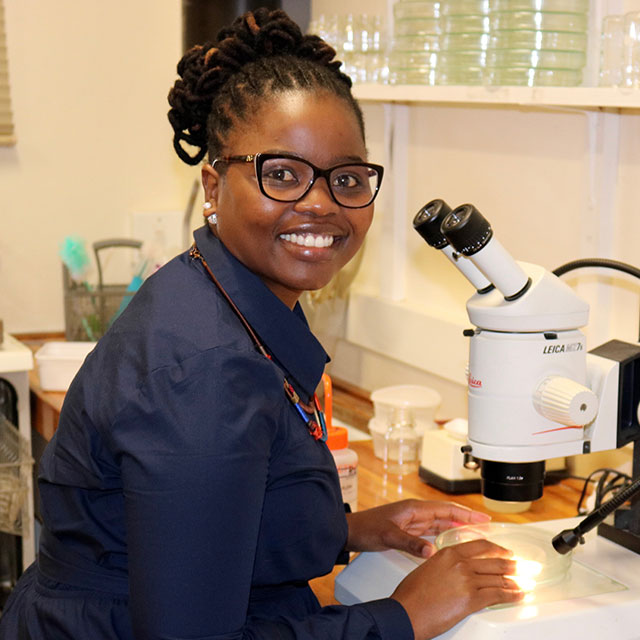
Nomakholwa Stokwe grew up very poor in Middledrift in the Eastern Cape and it was purely by chance and grace that she ended up studying. After seeing Nomakholwa’s matric results, her primary teacher decided to pay for her university application and registration. She then received a bursary and studied entomology at Fort Hare University. She did her postgraduate studies at Stellenbosch University (SU) and discovered a new species of nematode found in soil during her MSc degree studies on biological ways to control the obscure mealybug (Pseudococcus viburni). She graduated with an MSc (entomology) (2009) (cum laude) and a PhD (entomology) in 2016.
Since 2016, she has been a lecturer at SU’s Department of Conservation Ecology and Entomology and before that she worked as a researcher of the Agricultural Research Council at Infruitec-Nietvoorbij in Stellenbosch.
In 2017, Nomakholwa was nominated as an African Academy of Science (AAS) affiliate. The AAS affiliates programme provides support to Africans who hold a PhD and are aged 40 years and younger. The membership is for five years and a range of courses such as proposal writing and manuscript preparation are organised to enhance the professional development of the affiliate members. Recently she was also selected to be part of the Top 10 Y Agriculture Leaders by the National Agricultural Marketing Council (NAMC), an advisory body for the ministry of Agriculture, Forestry and Fisheries.
Nomakholwa learned with the years that “one’s background does not determine your future” and her vision is to excel in research and produce more postgraduate students. Her background, the people that believe in her and those that look up to her, are her motivation.
Certain characteristics (and a lot of hard work) were needed to get her where she is today. Enthusiasm played an important role as well as resilience as things didn’t always go as planned and securing funding sometimes was a problem. She found that networking in order to meet with potential contacts and relevant people in her field also helped a lot. Another key element in her career is time management “as it is not easy to juggle research, teaching and administration so it is very important to be organised and disciplined”.
She feels that the future of SU is promising “as the University is changing into a more diverse institution that accommodates students from all over. I have also noted a lot of changes and diversity during the last few years with regard to postgraduate students”.
- By Elbie Els -